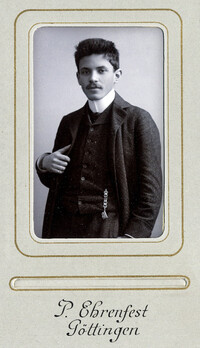Paul Ehrenfest Best Paper Award for Quantum Foundations
About the Award
The “Paul Ehrenfest Best Paper Award for Quantum Foundations” (hereafter “Ehrenfest Award”) is conferred annually, for the most significant publication in the foundations of quantum mechanics published in the five calendar years prior to the prize call. Both theoretical and experimental publications are eligible.
The aim of the award is to raise awareness for the field of quantum foundations, and to draw attention to new and interesting achievements in this area without delay. Candidate publications have to be published in a peer-reviewed journal. Other than that, papers from all areas in the foundations of quantum physics, and by authors of any background, will be eligible to receive the award.
The Name-Giver: Paul Ehrenfest

The award was named after Paul Ehrenfest (1880 – 1933), one of the trailblazers of quantum mechanics. The Austrian-Dutch theoretical physicist is perhaps best known for his theory of phase transition and the Ehrenfest theorem. His scientific body of work encompasses a wide range of areas, from statistical mechanics and the kinetic theory of matter to quantum theory, but also gravitation theory, electron theory, theory of light and magnetism. Paul Ehrenfest had the unique gift to contribute to the fundamental debate while drawing attention to critical aspects that had till then remained unnoticed. He was a close friend of Albert Einstein, who praised him for his passionate engagement for the development and future of his students. His lectures, were presented in an entertaining mix of Dutch, English and Vienna dialect, were considered brilliant. An empathic and deeply sensitive person, having repeatedly suffered from depressive episodes, he took his own life in 1933. In his farewell letter, he wrote that he had reached the limits of his scientific capability.
Award Rules
The “Paul Ehrenfest Best Paper Award for Quantum Foundations” (hereafter “Ehrenfest Award”) is conferred annually, for the most significant publication in the foundations of quantum mechanics published in the five calendar years prior to the prize call. Both theoretical and experimental publications are eligible.
While the Ehrenfest Award is managed by the Institute for Quantum Optics and Quantum Information in Vienna (IQOQI-Vienna) of the Austrian Academy of Sciences, the selection of awardee publications will be carried out by a five-member selection committee according to good practice. Recognized international scientists from the area of the foundations of quantum mechanics will be invited to serve on the committee. The maximum term of service will be 2 years (2 award cycles), with 2-3 committee members to be exchanged every year. One member will be chosen from the ranks of IQOQI- Vienna. IQOQI-Vienna will also provide the Ehrenfest Award secretary.
Committee members will be ineligible to receive the award during their period of service. Committee members will be recused from the discussion in cases where they cannot act objectively, as may arise, for instance, if a nominee is a close relative, regular co-author or close colleague of the committee member. The decision of what counts as close collaboration rests with the committee.
Researchers working on fundamental issues in quantum physics from all fields and levels will be eligible to nominate a “best paper” for the Ehrenfest Award. The candidate paper has to be published within the last 5 years in a peer-reviewed journal. Other than this restriction, no exclusion criteria are applicable, other than the conflict-of-interest criteria described in paragraph 3. Self-nominations are permissible. The selection committee will not be limited to nominations, but is free to select publications that were not nominated. In exceptional cases, more than one publication may be chosen by the selection committee to receive the award. No justification shall be expected from the selection committee for their decisions.
Nominations and self-nominations are to include a copy of the nominated publication and a short (2-3 paragraph) statement of the relevance of the contribution. In the case of single-author publications, the name and contact information of the author is to be given. In the case of multi-author publications, a representative author who will officially accept the Ehrenfest Award in person (see paragraph 6) shall be named and their contact information will be included. Consent from all authors as to which author will serve as the representative for the publication shall be obtained by the nominator, and a short confirmation to that effect shall be included with the nomination.
The prize money amounts to € 3.000,-. In the case of multi-author publications, the monetary award will be divided equally between all co-authors. If more than one publication is selected to receive the prize, it shall be divided equally among all winning papers. Each author will also receive an award certificate.
The author (in case of single-author publications) or the representative author (in case of multi-author publications) will be asked to deliver a public award lecture in Vienna, with all reasonable travel and accommodation costs covered by the Paul Ehrenfest Award funds.
